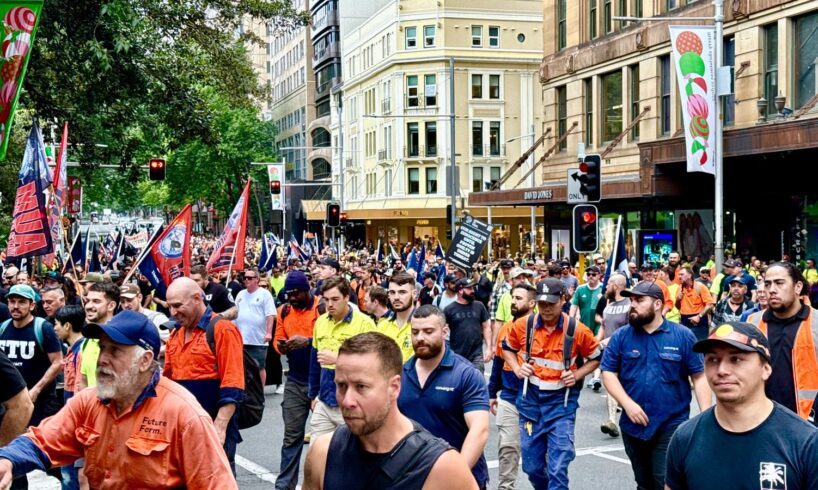
A recently concluded Fair Work Commission (FWC) inquiry into Master Builders Victoria (MBV), which represents major construction companies and property developers, has revealed that the big-business lobby group derives much of its revenue from Incolink, an industry redundancy fund it jointly controls with the Construction, Forestry and Maritime Employees Union (CFMEU) and other building industry unions. The CFMEU also received tens of millions of dollars in “grants” from Incolink.
As the main brokers of enterprise bargaining agreements in the building industry, the CFMEU and MBV have collaborated to ensure that this income stream keeps flowing by inserting clauses forcing employers and workers to use Incolink.
The fund has come under scrutiny because sections of the ruling class, including three “whistleblowing” MBV directors, are concerned that the organisation’s dependence on Incolink kickback clauses gives the CFMEU too much negotiating power. This is part of a broader disagreement over whether the union is still the best mechanism to enforce the cuts to wages and conditions demanded by big business and governments amid a downturn in the construction industry.
Building workers march in Sydney on November 12, 2024, in opposition to administration of CFMEU
The latter motivated the slanderous media campaign against the CFMEU last year, which led to the federal Labor government placing the union under the quasi-dictatorial control of an administrator and sacking hundreds of elected officials and delegates.
The Incolink revelations further expose as a total fraud the pretext—stamping out corruption in the building industry—of the anti-democratic attack on building workers.
For decades, the ruling class, with Labor governments playing the leading role, have promoted the integration of the union bureaucracy into corporate boardrooms through their joint control of major financial institutions.
The alignment of the interests of ostensibly opposed forces, business lobbyists and union officials, as demonstrated with Incolink, involve far greater financial resources than do the almost entirely unsubstantiated allegations of individual and isolated corruption that were used to justify the administration.
While the investigations into Incolink were prompted by a dispute within the ruling class, there are important lessons for workers about the collaboration of the unions and big business. Sharply exposed is that neither the MBV nor the CFMEU bureaucracy have any concern for the workers whose entitlements Incolink is supposed to protect. Both are entirely preoccupied with defending and increasing their share of the spoils.
Started in 1989, Incolink is a worker entitlement fund, into which employers pay regular contributions to cover long service leave, sick leave and redundancy payouts, as well as insurance to cover lost income in the event of serious injury or death. Such arrangements are most common, and in some cases required by law, in industries such as construction, where employment tends to be transient and workers would otherwise not be engaged by a single company for long enough to accrue these basic entitlements.
While not on the same scale as the major superannuation funds, which are now among the largest financial institutions in Australia and control more than $4.2 trillion, the industry redundancy funds likewise exemplify the cosy relationships between union leaders and corporate bosses. In both cases, workers’ entitlements are co-opted to fund speculation on the financial markets. Incolink alone has some $1.3 billion under management.
Unlike the so-called “industry” super funds—i.e., those run jointly by the unions and management—there is no requirement for redundancy funds to pass surpluses from investment returns on to members. Workers also do not have the right to use a different redundancy fund than the one set down in their enterprise agreement. Incolink has taken advantage of these factors to funnel millions of dollars in annual “grants” to both MBV and the CFMEU.
Moreover, MBV directors Raymond French, Lisa Hollingsworth and Greg Cole alleged early this year that some of these grants were directly funded from money supposedly set aside for workers’ entitlements.
They claimed, according to the Australian Financial Review (AFR), that “Incolink unlawfully forfeits members’ money if they make no contributions for two years and then distributes it to the CFMEU and MBAV as grants for safety or training.”
Similar practices by Incolink were flagged in the 2015 Trade Union Royal Commission as potentially violating Victoria’s unclaimed money laws, under which such funds are supposed to be transferred into a central state fund.
Incolink denied the MBV directors’ allegations, stating that it “categorically rejects that such funds are distributed to shareholders,” but admitted that money from “dormant” accounts “can be utilised to cover reasonable administration expenses.”
The FWC investigation found that Incolink was the source of around half of MBV’s revenue in recent years, contributing virtually all of the organisation’s income from grants, which totalled $11.2 million in 2023–24 and $9.5 million in 2022–23.
FWC general manager delegate Chris Enright told the AFR, “There is no information before me that the MBV has made any reasonable efforts to proactively or comprehensively disclose the details of its relationship with Incolink, or the quantum of the grants from Incolink, to its members.”
Indeed, the word “Incolink” does not appear in MBV’s annual financial reports for 2022–23 or 2023–24, despite being far and away its largest single source of revenue. Instead, this income is listed simply under “grants,” which the reader is presumably meant to infer means “government grants,” which are referred to at some length in the explanatory notes.
The organisation’s latest financial report, released several days after the FWC ruling and with the cat well and truly out of the bag, does break down the sources of MBV’s grant income. It reveals that in the 2024–25 financial year, Incolink handed over a total of $16.7 million, 98.9 percent of MBV’s grant income and 54.9 percent of the organisation’s total revenue.
In 2023–24, Incolink grants of $11.1 million represented 99 percent of total grant income and 44.4 percent of overall revenue, according to the 2025 report.
The upshot is that MBV, which reported surpluses of $2.06 million in 2023–24 and $3.24 million in 2024–25, would be operating at a substantial loss without the Incolink kickbacks.
The FWC noted that MBV chief executive Michaelia Lihou and executive director Giovanni Abelardo, current and former Incolink directors, were centrally involved in negotiating enterprise agreements with the CFMEU requiring companies throughout the building sector and more broadly across Victoria to make regular contributions to Incolink on behalf of their workers.
The industry lobbyists are joined on the Incolink board by the other leading figures involved in brokering these enterprise bargaining deals: The CFMEU’s national and Victorian secretary, Zach Smith, and senior legal and industrial officer, Sherri Hayward, as well as Earl Setches, state and federal secretary of the Plumbing Trades Employees Union.
CFMEU records indicate that, between August 2021 and October 2024, the Victorian branch of the union received $28.7 million in Incolink grants for the design and construction of a new “Wellness Centre” in Melbourne. Smith announced last month that the facility had been independently valued at just $8 million.
The recent furore over Incolink is primarily motivated by ruling class concerns that premiums for redundancy and other entitlements are too high and that MBV’s dependence on Incolink keeps construction companies shackled to the CFMEU. This cuts across plans—in which administration was only the first step—to further neuter the building union or destroy it entirely as part of a deeper attack on wages and conditions across the construction sector.
There are also concerns over efforts to expand Incolink’s reach outside of Victoria, including in South Australia and New South Wales. Already, some CFMEU-brokered enterprise agreements in other states have replaced existing redundancy funds with Incolink.
The real victims of these CFMEU-MBV deals are the workers, whose job security, leave entitlements, health and lives have been transformed into profit centres for the union bureaucracy and construction industry executives.
This is emblematic of the broader transformation of the trade unions over the past four decades. No longer workers’ organisations in any way, shape or form, their role is to enforce the demands of corporations and governments for ever-lower labour costs, in order to make “Australian” businesses more competitive on an international scale.
As growing numbers of workers have left the unions, seeing no compelling reason to pay membership dues to bureaucracies that block their struggles, the unions have turned to other, far more lucrative, sources of revenue, such as the superannuation and redundancy funds.
Financial wheeling and dealing, collaborating with employer groups whose aim is to slash wages and conditions, and profiteering from workers’ basic entitlements have nothing in common with the interests of the working class.
This underscores that workers, in the building industry and more broadly, need to build new organisations of struggle, rank-and-file committees led by workers themselves, to advance their interests in opposition to the corporations, the union bureaucracy and big business governments.
Sign up for the WSWS email newsletter





